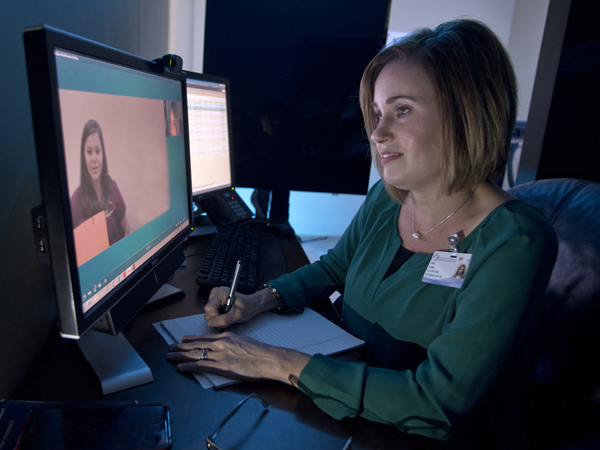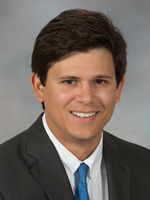UMMC telemental and behavioral health programs among nation’s best

Mississippi's supportive policy landscape for telemedicine, including services for residents coping with mental illness, has earned the state an overall “A” rating from the American Telemedicine Association in its 2016 state-by-state report card.
Mississippi is among only eight states earning that highest score in the association's evaluation of performance in telemental and behavioral health. The Center for Telehealth at the University of Mississippi Medical Center in 2015 recorded 1,600 psychiatry patient encounters -- nearly double the 900 in 2014.
The center fills gaps in mental health services in the state's rural corners by offering general and specialized psychiatric services delivered by an experienced team of psychiatrists, psychiatric nurse practitioners, psychologists, counselors and therapists. Patients ranging from children to the elderly are treated using a live audiovideo stream on a computer that connects them with specialists at UMMC. Visits are conducted discreetly in their local doctor's office, or locations including schools, hospitals or community mental health centers.

“We're pleased that the ATA has recognized Mississippi as A-rated,” said Michael Adcock, the center's administrator. “This rating was earned by the hard work and support of leaders across our state. It's created an environment that allows us to provide expert care to patients in their communities and homes.”
“Mississippi continues to lead the nation in telemedicine,” said Gov. Phil Bryant. “I am proud we have created an environment where telemedicine can grow, prosper and treat our citizens who most rely on dependable availability of quality health care. I congratulate everyone involved in making our latest A rating a reality.”
The ATA's state policy report released June 30 identifies barriers that impede the use of telemental health services meant to give both patients and psychiatric caregivers choices in delivery of services. The ATA evaluates policies in each state based on psychiatric clinical practice standards and licensure, information collected from state statutes, state regulations and other federal and state policy resources.
Key policy changes enacted by the Mississippi Legislature led to the state's recognition as one of the best in telemedicine and telemental health advancement. In 2013, Mississippi became the 16th state to require health insurance plans to provide coverage and reimbursement for telehealth services at the same rate as in-person visits. That was followed by 2014 legislation requiring equal insurance coverage and reimbursement for remote patient monitoring and store-and-forward telehealth.
This year, the Legislature authorized the Mississippi Board of Medical Licensure to join the 17-state Interstate Medical Licensure Compact as a means to expedite licensure for out-of-state physicians seeking to practice medicine - including telehealth -- in Mississippi.

Mississippi has the nation's eighth-highest rate of residents reporting a mental health issue -- 439,000, or 20.27 percent. Yet only 239 psychiatrists are licensed to practice in Mississippi, and 70 percent of them are age 50 or older, Center for Telehealth statistics show. “There's a huge need,” said Julio Cespedes, the center's telemental health project manager. “We bring the mental health provider to the community at the level and quantity of help they need.”
The use of telemedicine and telemental health greatly benefits both patients and providers. Its cost-effective delivery results in lower costs, expanded capacity, enables care for more patients within existing facilities, and extends care to a wider population.
In the state's rural communities that have few health resources and no specialty care, patients in 53 of the state's 82 counties can receive treatment in more than 35 specialties that's convenient and close to home so that they can avoid drives to the Jackson campus and make fewer emergency department visits in their own communities.
TelEmergency alone, from 15 emergency departments across the state, has resulted in a 25 percent reduction in rural emergency room staffing costs, a 20 percent reduction in unnecessary transfers, and patient outcomes that are on par with those of an academic medical center.
And, telemental and behavioral health is offered discreetly in a patient's primary care clinic, community health center, hospital or school student health operation. Because telemental appointments are conducted like any other private office visit, patients feel less of a stigma.

“We have some of the most comprehensive telehealth legislation in the country,” said Dr. Claude Brunson, professor of anesthesiology, senior advisor to the vice chancellor for external affairs and director of the Office of Government Affairs at UMMC.
“Our governor has been a champion of telehealth in all aspects. We've been able to work through the office of U.S. Rep. Gregg Harper, along with Senators Roger Wicker and Thad Cochran, to promote national legislation. They've used the example of how we've been able to be a national leader here.”


